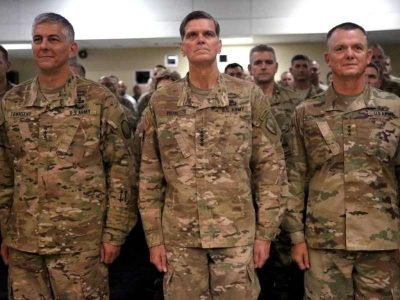US army general concerned about China and Russia’s growing influence in Africa
If African governments overlook the United States (US) as their international partner and opt for China and/or Russia, this will affect the US’ global influence.
This is according to General Stephen J Townsend, US commander of the United States Africa Command (Africom).
Based in Stuttgart, Germany, Africom is responsible for US military operations, including fighting regional conflicts and maintaining military relations with 53 African nations.
Appearing before the US Senate Armed Forces Committee last week, Townsend said: “Africa lies at a global crossroads. This enormous continent’s environment is complex – ripe with opportunity but burdened with challenges.”
He added that geopolitically, Africa is strategic. But at the centre of the continent’s future, the key factors affecting it are “competing forces of prosperity and poverty, peace and conflict, plenty and famine, good governance and corruption and democratic backsliding”.
In his presentation, Townsend highlighted that Africa is where the US gets key supplies to produce 21st century technologies and transition to clean energy, including mobile phones, jet engines, electric-hybrid vehicles and missile guidance systems.
However, since realising the power Africa has, Russia and China have been making inroads into the continent at the US’ expense.
He said: “Strategic rivals, China and Russia, have long recognised Africa’s importance. Both nations leverage opportunities to erode US influence with African nations. Both nations are gaining ground on the continent. Both nations successfully convert soft and hard power investments into new partnerships. Both nations exert political influence at US expense.”
Townsend added that while China is playing a “long game”, its machinations are clearing the way for the Chinese military to establish in Africa.
“China’s heavy investment in Africa as its ‘second continent’ and heavy-handed pursuit of its One Belt, One Road initiative is fuelling Chinese economic growth, outpacing the US and allowing it to exploit opportunities to their benefit.
“This year China significantly expanded the capabilities of its Doraleh Naval Base in Djibouti, Beijing’s only permanent overseas military base, by adding a large and capable pier while advancing plans to establish a second location along West Africa’s Atlantic Coast,” the general said.
He also projected that by 2030, Chinese military facilities and technical collection sites in Africa would allow Beijing to project power eastward into the Middle East and Indo-Pacific theatres and west into the Atlantic.
If this is allowed to happen, it will result in increased risk to freedom of navigation and the US’ ability to act in situations.
In the case of Russia, Townsend accused the east European superpower of continuously undermining the “rule of law by exploiting insecurity and diplomatic disputes to expand its presence in Africa, primarily through its use of Kremlin-backed Wagner Group”.
The Wagner Group, although linked to the Russian government, is modelled as a private army. It gained global prominence during the Donbas War in Ukraine in 2014. A network of mercenaries, the group has footprints in Libya, Sudan, Mozambique, Central African Republic (CAR), and lately Mali, so far.
Townsend said through the Wagner operations, Russia has cemented its place as the biggest arms dealer on African soil.
“Moscow remains Africa’s largest arms supplier, having increased exports by 23% over the last four years. The Kremlin’s willingness to sell weapons to authoritarian leaders and combatants without end-user agreements fuels militarisation and escalates conflict and instability across Africa,” he said.
He said the US mission in Africa should maintain America’s strategic access and influence on the continent because failure to achieve this objective means failure everywhere else.


